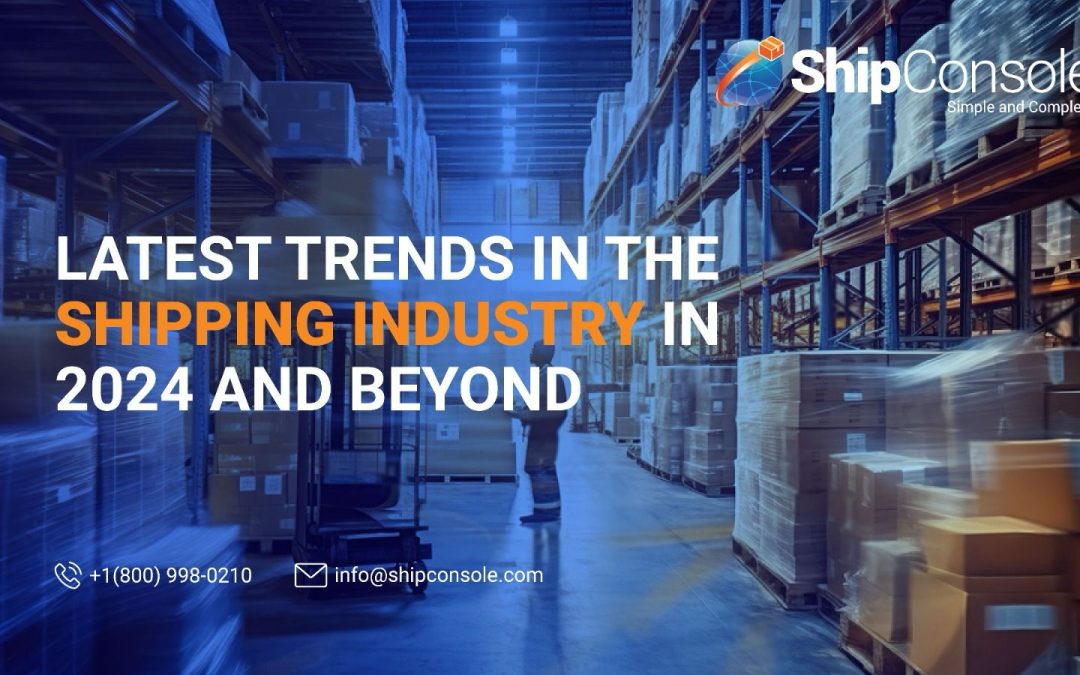The shipping industry is already witnessing its share of disruptive changes in 2024, primarily through the application of cutting-edge technologies and practices that are sustainable and innovative. As businesses navigate this dynamic landscape, multi-carrier, multimodal shipping software like ShipConsole is critical for staying competitive. Digital transformation—from digital automation to paperless invoicing—is driving trends revolutionizing shipping, which now is laying down the foundation for a more efficient and sustainable future.
Digital Transformation and Automation
The shipping industry is undergoing a significant digital transformation driven by the need for higher efficiency and transparency. To leverage the rise of automation technologies—from AI-powered logistics platforms to autonomous ships. This increases the level of automation, reduces human errors, and optimizes route planning. Such processes include multi-carrier and multi-modal shipping software for interoperability among various carriers and modes of shipment.
Enhanced Visibility of the Chain of Supply
Real-time tracking has become one of the features contributing to enhanced supply chain management. An obvious and transparent end-to-end enabled real-time track of the shipment across all stakeholders will be realized, including real-time monitoring of conditions and timely updating. This builds trust and reduces the risk of any kind of disaster. Integrated tracking features in multi-carrier, multimodal shipping software enhance supply chain visibility and efficiency. Moreover, such a tool as ShipConsole includes automated email notifications and access to proof-of-delivery.
Global Trade Dynamics and Geopolitical Factors
Global trade dynamics are dependent on geopolitics about treaties, tariffs, and regional conflicts. Swift is the adaptation of flexible and resilient supply chain strategies to reduce risks. Diversification of the sourcing and manufacturing location becomes common to ensure continuity in the face of geopolitical uncertainties. ShipConsole helps navigate these complexities by providing tools to manage shipping operations across regions and carriers.
Shipping Analytics
Shipping analytics are reshaping the decision-making process in the shipping world. By analyzing large volumes of data, companies can undertake the management of transportation spend, freight audits, and complete shipping operations. This enables better prediction of demand, optimization of routes, management of inventory, and forecasting of maintenance. ShipConsole uses these analytics to allow businesses to make the right decisions on shipping, improve logistics performance, and lower costs.
Freight Management Mobile App
The importance of mobile applications in the shipping industry is invaluable. They provide real-time updates, enhance communication, and simplify processes to make shipping operations more effective. ShipConsole allows freight shipments using the mobile app, through which drivers can sign in and out and take photos for electronic signing of a Bill of Lading. It also consolidates documents for clearance. All of that means that a mobile solution coming from ShipConsole will improve workflow, reduce paperwork in freight management, and enhance overall efficiency, perhaps by a factor heretofore not conceivable.
Shipping APIs for No-Touch Integration With the Warehouse
The availability of powerful shipping APIs in no-touch warehouses is essential. ShipConsole provides powerful APIs that integrate with ERP systems, multiple carriers, scales, and print-and-apply equipment to perform seamless processes, e.g., print shipping labels and apply them on packages, without any manual intervention. Using the API capabilities available in ShipConsole, warehouses can smoothen operation flows to eliminate errors and raise efficiency during a print-and-apply process.
Paperless Invoicing
Inroads toward paperless invoicing have gained momentum, with UPS and FedEx mandating that companies effect this change this year. This development can be pivotal in enabling organizations to reduce their carbon footprints while simultaneously increasing productivity. The digitization of the invoicing process has eliminated unnecessary lags in time, curbing chances of error and raising efficiency in record keeping. Paperless invoicing is implemented in ShipConsole to assist the companies towards sustainability and compliance with their efforts aiding in a quicker billing process.
Compliance and Standards
In shipping, compliance with international regulations and standards is critical. New rules have come into place regarding emissions, safety, and data protection. Companies also need to be kept informed about such changes to avoid penalties and operate smoothly. ShipConsole safeguards compliance with regulations because it is competent in shipping management and has the most extensive variety of parcel and freight carriers.
Conclusion
Shipping is one business that is ever on the threshold of technological and operational improvement. Companies will be able to remain viable and competitive if they adopt these trends in a landscape that is changing worldwide very fast. Be it digital transformation, sustainability, or any other drive, the future of shipping is innovatory and growth-bound. Solutions like ShipConsole are essential for us in navigating this changed landscape with advanced tools to run our operations—that are efficient, compliant, and sustainable.

Pavan Telluru works as a Product Manager at ShipConsole. He brings over a decade of experience to his current role where he’s dedicated to conducting product demos to prospects and partners about how to organizations can efficiently manage their shipping execution process. He also leads marketing efforts at ShipConsole.


